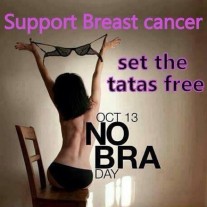It is generally accepted that ‘sex sells’, whether it is for a sports car, chocolate or even in some cases campaigning for charity. However, where do we draw the line with it comes to sexualised advertising? Is charity immune?
Body image and physically are consistently major issues discussed in the media and in advertising. In terms of the portrayal of women in these areas, there is a trend that we are drawn to four highlighted factors: eyes, lips, chest and legs. These four features are seen to be essential to the physical ‘female identity’.
Breast Cancer is the one of the most common types of Cancer diagnosed among women in Australia. As this disease is directly related to a part of the body (the breast) most usually associated with female ‘identity’ and ‘physicality’, some of the marketing around related charities have been seen to have sexualised Breast Cancer. In light of this, I propose a  content analysis of charity marketing materials including slogans such as “save the tatas” and “don’t let cancer steal second base”. I noticed that they were offensive and it could be said that it is sexually objectifying Breast Cancer. After reading an article ‘Breast cancer isn’t sexy’: Woman shares post-radiation images to show reality of disease’ from the Independent, it is notable that there is a growing reputation of Breast Cancer as a “sexy disease”. It refuted this with photographs and commentary from social media that illustrates the reality of Breast Cancer, it is something that goes beyond the breast itself, and have a very real emotional and physical toll on its sufferers.
content analysis of charity marketing materials including slogans such as “save the tatas” and “don’t let cancer steal second base”. I noticed that they were offensive and it could be said that it is sexually objectifying Breast Cancer. After reading an article ‘Breast cancer isn’t sexy’: Woman shares post-radiation images to show reality of disease’ from the Independent, it is notable that there is a growing reputation of Breast Cancer as a “sexy disease”. It refuted this with photographs and commentary from social media that illustrates the reality of Breast Cancer, it is something that goes beyond the breast itself, and have a very real emotional and physical toll on its sufferers.
As a result, the primary question I will address through my research is, “are we trying to make Breast Cancer sexier?”
In order to explore this question, most of my research will be based around secondary research and content analysis on the sexualisation of Breast Cancer. This will enable a well-rounded insight into this issue through reference to exisiting ideas and discourse, and also my original analysis of content.
As part of my own investigation I intend to conduct a poll on the general publics perception on the topic. I intend to ask questions to highlight how many people on various social media networks are aware of this sort of sexualisation, how effective are certain marketing slogans, and it would also be a useful way to analyse empathy towards Breast Cancer and the way it is portrayed.
Although due to the nature of the question I am aware of the ethical boundaries I am to face. When asking questions in my poll I am to be mindful, as well as the structure and expression in conveying meaning.
Pursuing the question will increase my own personal interest in the topic, as well as challenge curiosity, reflexivity and social responsibility. It allows us to identify how the sexualisation of such a controversial topic such as Breast Cancer stigmatises the subject and ultimately effects past, present and future patients.
References:
- Sims, A. (2015). “Breast cancer isn’t sexy” says survivor who has shared her post-radiation scars. [online] The Independent. Available at: http://www.independent.co.uk/life-style/health-and-families/health-news/breast-cancer-isn-t-sexy-woman-shares-post-radiation-images-to-show-reality-of-disease-a6709516.html [Accessed 8 Mar. 2016].
- Whatdomenreallythink.com. (2016). What Do Men Find Attractive in a Woman?. [online] Available at: http://www.whatdomenreallythink.com/howto/traits-men-find-attractive-in-women.php [Accessed 10 Mar. 2016].
- Canceraustralia.gov.au. (2016). Breast cancer statistics | Cancer Australia. [online] Available at: http://canceraustralia.gov.au/affected-cancer/cancer-types/breast-cancer/breast-cancer-statistics [Accessed 28 Mar. 2016].
Great topic Mia, yeah breast cancer is probably the most dangerous cancer for women (and sometimes men) out of the lot. I think you could have maybe provided some more statistics on how it could be prevented or the average ofhow many people die from breast cancer each year. 🙂
LikeLike
Interesting topic, i will be intrigued to see what you find out. Maybe you could see what people think about the ‘i love boobies’ campaign by keep a breast. http://keep-a-breast.org/. within your surveying you could show people images from different breast cancer advertisements in order to determine their thoughts and attitudes towards these advertisements. It might also be interesting to see whether the opinion is different between males and females.
LikeLike
I think you need to make a distinction between messaging about cancer, and messaging about cancer fundraising. One is targeting cancer patients and their families, and one is largely targeting healthy people who want to “do something” about cancer. Cancer fundraising very often manages to misrepresent cancer and exasperate cancer patients. Take a look at the Twitter hashtag #pinktober, and then this blog for an alternative position http://www.beautydespitecancer.co.uk/blog/2014/sep/pinktober-it-will-turn-you-green?utm_content=buffera56a1&utm_medium=social&utm_source=twitter.com&utm_campaign=buffer
LikeLike